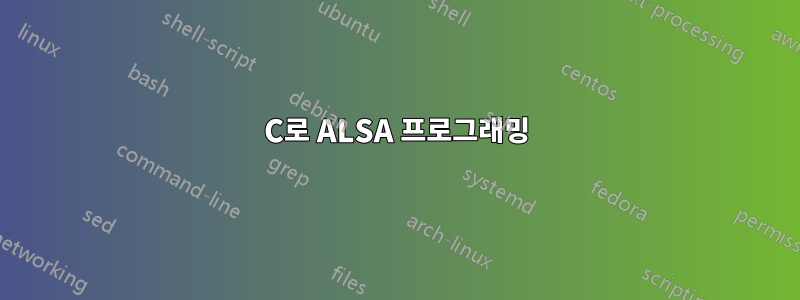
오디오 장치에서 녹음하는 데 도움이 되는 C 프로그램을 사용하고 있습니다. 코드는 다음과 같습니다.
/* Use the newer ALSA API */
#define ALSA_PCM_NEW_HW_PARAMS_API
#include <alsa/asoundlib.h>
int main() {
long loops;
int rc;
int size;
snd_pcm_t *handle;
snd_pcm_hw_params_t *params;
unsigned int val;
int dir;
snd_pcm_uframes_t frames;
char *buffer;
/* Open PCM device for recording (capture). */
rc = snd_pcm_open(&handle, "default",
SND_PCM_STREAM_CAPTURE, 0);
if (rc < 0) {
fprintf(stderr,
"unable to open pcm device: %s\n",
snd_strerror(rc));
exit(1);
}
/* Allocate a hardware parameters object. */
snd_pcm_hw_params_alloca(¶ms);
/* Fill it in with default values. */
snd_pcm_hw_params_any(handle, params);
/* Set the desired hardware parameters. */
/* Interleaved mode */
snd_pcm_hw_params_set_access(handle, params,
SND_PCM_ACCESS_RW_INTERLEAVED);
/* Signed 16-bit little-endian format */
snd_pcm_hw_params_set_format(handle, params,
SND_PCM_FORMAT_S16_LE);
/* Two channels (stereo) */
snd_pcm_hw_params_set_channels(handle, params, 2);
/* 44100 bits/second sampling rate (CD quality) */
val = 44100;
snd_pcm_hw_params_set_rate_near(handle, params,
&val, &dir);
/* Set period size to 32 frames. */
frames = 32;
snd_pcm_hw_params_set_period_size_near(handle,
params, &frames, &dir);
/* Write the parameters to the driver */
rc = snd_pcm_hw_params(handle, params);
if (rc < 0) {
fprintf(stderr,
"unable to set hw parameters: %s\n",
snd_strerror(rc));
exit(1);
}
/* Use a buffer large enough to hold one period */
snd_pcm_hw_params_get_period_size(params,
&frames, &dir);
size = frames * 4; /* 2 bytes/sample, 2 channels */
buffer = (char *) malloc(size);
/* We want to loop for 5 seconds */
snd_pcm_hw_params_get_period_time(params,
&val, &dir);
loops = 5000000 / val;
while (loops > 0) {
loops--;
rc = snd_pcm_readi(handle, buffer, frames);
if (rc == -EPIPE) {
/* EPIPE means overrun */
fprintf(stderr, "overrun occurred\n");
snd_pcm_prepare(handle);
} else if (rc < 0) {
fprintf(stderr,
"error from read: %s\n",
snd_strerror(rc));
} else if (rc != (int)frames) {
fprintf(stderr, "short read, read %d frames\n", rc);
}
rc = write(1, buffer, size);
if (rc != size)
fprintf(stderr,
"short write: wrote %d bytes\n", rc);
}
snd_pcm_drain(handle);
snd_pcm_close(handle);
free(buffer);
return 0;
}
사용해야 하는 프로그램의 출력을 저장하려면 다음을 수행하십시오.
gcc record.c -o out -lasound
./out >sound.raw
내 문제는 마지막 줄입니다. 프로그램 안에 있고 싶습니다. 즉, 출력 리디렉션이 전혀 수행되어서는 안되며 프로그램이 실행되고 데이터가 저장됩니다! 어떻게 할 수 있나요?
도움을 주셔서 미리 감사드립니다!
답변1
호출 write(1, ...은 표준 출력에 기록됩니다. 파일에 쓰도록 변경합니다.
(그리고 이 프로그램에는 모든 set기능에 대한 오류 처리 기능이 부족합니다.)


